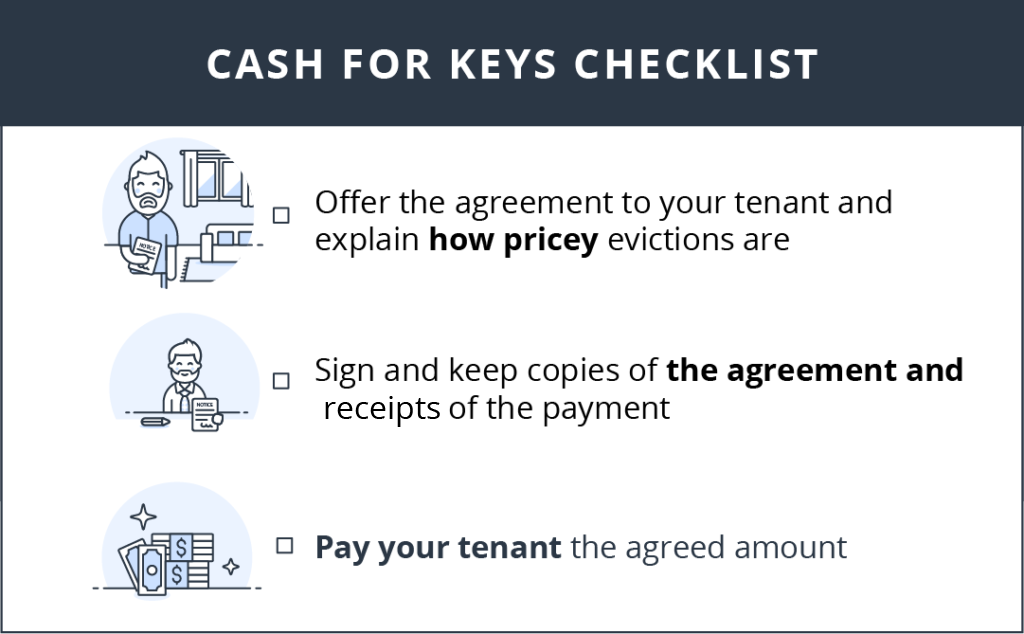

While the concept might be unfamiliar to you, it’s a great alternative to the eviction process, which can be expensive and time-consuming. Knowing all your options when it comes to removing or changing tenants will help you seamlessly run your rental business.
 keys agreement occurs when a landlord pays their tenant a sum of money to vacate the rental property." width="1024" height="546" />
keys agreement occurs when a landlord pays their tenant a sum of money to vacate the rental property." width="1024" height="546" />
A cash for keys agreement occurs when you pay your tenant a sum of cash to vacate the property. You might be wondering if that type of agreement is legal in the first place. It is, as long as you follow the right procedure and have checked your local and state laws regarding cash for keys agreements.
A cash for keys agreement might be a smart option:
More often than not, tenants are open and motivated to accept a cash for keys agreement. If they can’t afford rent, the idea of getting cash to vacate can be a win-win situation for both parties. It’s also a great alternative to the eviction process as evictions can take months and be quite costly (the average cost of an eviction lies between $4,000 and $7,000) for both landlords and tenants. Evictions require specific steps and legal procedures that are different in every state – typically, landlords have to give notice, then file an eviction with the courthouse, and participate in the eviction hearings. It’s important to know your options as a landlord and consider what’s best for you and your property long term.
The process for cash for keys is simple, fast, and efficient:
The amount for the cash for keys agreement will obviously depend on where you live and the cost of living in your location – again, be sure to check your state and local laws. Generally, the amount is usually half a month’s rent plus security deposit, or a full month’s rent. Another option is to offer how much court fees would’ve been if an eviction notice was filed – typically, it can range from $1,000-$3,000.
While the process can be fairly simple, there are some things you should probably avoid:

Having the proper cash for keys agreement form proves that you and your tenant are on the same page about this agreement. It acts a legal and binding record that you both agreed to. Here is where you can find a cash for keys agreement form along with other essential landlord documents.
Overall, cash for keys agreements can be the perfect solution for not only landlords, but also tenants who need cash and who don’t want to go through the complicated and expensive eviction process. Make sure you follow the correct protocol and are always checking your local and state laws regarding your actions. Remember that proper tenant screening will help you avoid situations like cash for keys or evictions from the start.
Need More Landlord Forms?Download our essential landlord forms pack for just $199 in your TurboTenant account. From welcome letters to property inspection forms, we have you covered.
Need More Landlord Forms?Download our essential landlord forms pack for just $199 in your TurboTenant account. From welcome letters to property inspection forms, we have you covered.
Simply put, a cash for keys agreement is where the landlord offers their tenant a lump sum of money for them to vacate the property.
Cash for keys agreements are legal in all 50 states, with the stipulation that you follow the right procedure and have checked your local and state laws regarding cash for keys agreements.
A cash for keys agreement is an excellent alternative to an eviction, which is a costly, time consuming, and stressful legal process for both the landlord and tenant. Additionally, many tenants will welcome a cash for keys agreement if they are unable to afford rent payments.
The amount of money you offer varies depending on where you live, the cost of living in your location, and local/state laws. Generally, the amount is usually a half month’s rent plus the security deposit or a full month’s rent.
Disclaimer: TurboTenant, Inc does not provide legal advice. This material has been prepared for informational purposes only. All users are advised to check all applicable local, state and federal laws and consult legal counsel should questions arise.